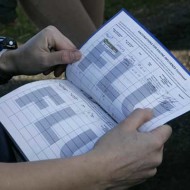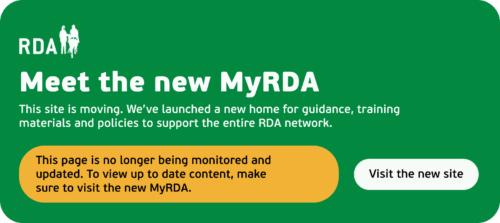RDA Free Vaccine Scheme
For a number of years, pharmaceutical companies have supplied free vaccines for RDA Equines ‘who contribute a significant amount of their time doing RDA activities’. The vaccine companies involved have been supplying several hundred doses every year, and it is important to ensure that their charity is not abused. Please be aware, it covers the cost of the vaccine only and not the cost of travel services or call out.
To claim your free vaccine you will need to print out the form relating to the vaccine reimbursement scheme to the right of this page. The form will need to be signed by a Trustee of the group and the Vet who administered the vaccines. The group should keep the original and then send a copy to the relevant participating pharmaceutical company, this will depend on the type of vaccine administered (your Vet will advise if you aren’t sure) The Veterinary practice will then be reimbursed on a quarterly basis.
The vaccine companies which support this scheme are:
- Boehringer Ingelheim Ltd, Ellesfield Avenue, Bracknell, Berkshire RG12 8YS
- MSD Animal Health, Companion Animal Business Unit, Walton Manor, Walton, Milton Keynes, Buckinghamshire MK7 7AJ
- Zoetis UK Ltd, First floor, Birchwood Building, Springfield Drive, Leatherhead, KT22 7LP.
The RDA recommends that all horses are vaccinated against equine influenza and tetanus to prevent these debilitating, and potentially fatal, diseases. The RDA recommend the following protocol:
PRIMARY COURSE
- V1 (Initial Vaccination)
- V2 (Second Vaccination): should be administered 21-60 days after V1
- V3 (First Booster Vaccination, sometimes referred to as the Third Vaccination): should be administered 120-180 days after V2
SUBSEQUENT BOOSTER SCHEDULE
The RDA recommends that subsequent booster vaccinations should be administered no later than 12 months. However, there is considerable scientific evidence to support the assertion that horses which are vaccinated at six monthly intervals are protected more effectively from clinical signs of ‘flu than those vaccinated at 12 monthly intervals, and are less likely to transmit infection. Consequently, some groups may elect to follow this optimal schedule and vaccinate their horses every six months.
The response to vaccination is not immediate and there must be an interval of at least 7 days between the most recent vaccine dose and mixing with other horses to have some benefit from that recent vaccine. This is a particularly important point to consider when introducing a recently vaccinated new animal to a property.
VACCINATION FOR COMPETITION
Vaccination requirements for competition may vary between events and between venues so it is the responsibility of the owner, yard owner or designated person to ensure that the horses are compliant with any regulations before arrival at the event.
For RDA Regional Qualifiers and RDA National Championships, all horses must be vaccinated as follows:
- Initial primary course of two vaccinations (V1 and V2) must be given. The second vaccination (V2) must be administered within 21-60 days of the first vaccination (V1)
- Horses may attend events 7 full days after receiving the second vaccination (V2) of a primary course.
- A first booster vaccination (V3) must be administered within 120-180 days of the administration of the second vaccination (V2)
- Subsequent booster vaccinations must be administered at a maximum of 12 month intervals.
- For National Championships, the most recent vaccination must have been administered within 6 months of the date of arrival at the competition.
- Horses and ponies must not attend gatherings within 7 days of receiving any vaccination.
- Any horse which is found to have breached the requirements above in relation to V1 (initial vaccination); V2 (second vaccination) and V3 (first booster), or exceeded 12 months between subsequent boosters, will be required to restart with a new primary course.
- All horses and ponies travelling to competitions must have a valid passport from which the equine’s identification can be verified. The passport must contain all vaccination details which must be up to date, completely and clearly recorded, and signed and stamped by a veterinary surgeon, who is not the owner of the animal. Passports with missing, altered, unclear or incomplete vaccine records will not be accepted and entry to events may be refused. The passport must travel with the equine at all times.
Exemptions
The following exemptions will apply to solve potential problems for older horses:
- Horses that received the primary course prior to 1 January 2024 are permitted to have an interval of between 21-92 days between the first (V1) and second (V2) vaccination of a primary course, and for the first booster (V3) to have an interval of between 150-215 days following the date of administration of vaccination V2.
- For the period 1 October 2022 to 31 December 2022, lower risk equines may have, with veterinary advice and approval, extended the annual booster period to 15 months if there was a genuine shortage of vaccine. The subsequent booster should have been made within 9 months, resulting in two booster vaccinations within 2 years and making the 2023 vaccine booster date no more than 24 months from the 2021 due date. Vaccination records which have this extension clearly approved and annotated by the vet will be accepted at RDA Regional Qualifiers and National Championships.
RDA reserve the right to amend these vaccination rules.
HORSES AND PONIES ATTENDING RACECOURSES
Please be aware that any horse or pony attending an event at, or entering, a racecourse within 8 days preceding a race meeting will be required to comply with the British Horseracing Authority (BHA) vaccination protocol. Currently this is a primary course with date intervals of 21-60 days between the first and second injections, and date intervals of 120-180 days between the second vaccination and first booster injections. All subsequent booster injections must have been administered within 6 months of the previous injection.
What is Equine Flu?
Equine Influenza, sometimes referred to as equine flu or horse flu, is a highly contagious respiratory infection.
An infected horse will show clinical signs similar to those of human flu and will be infectious for about a week. Tens of thousands of horses can be affected by one outbreak. Although rarely fatal, it can have a huge impact on competition and breeding due to restriction of horse movements.
Signs of infection


